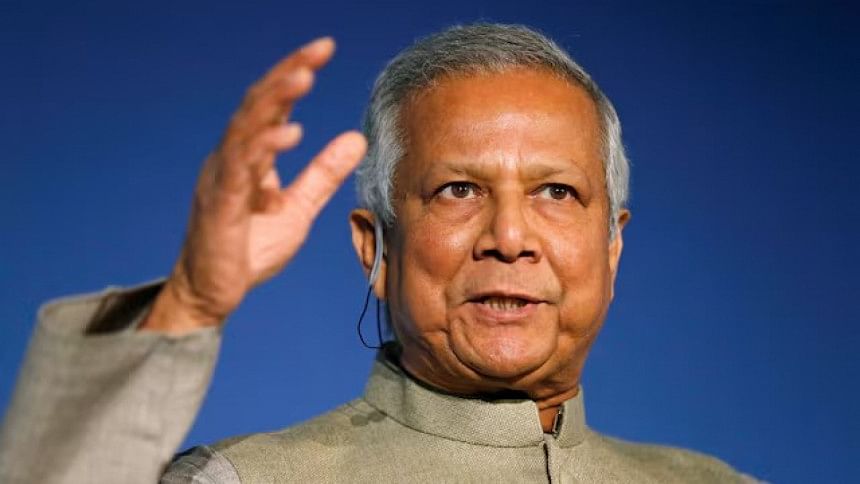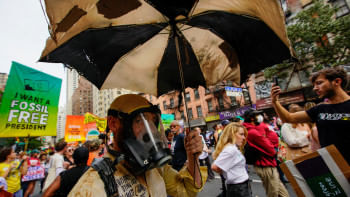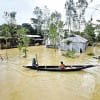Prof Yunus should take the climate fight to UNGA

As world leaders gather at the United Nations General Assembly (UNGA) this September, Bangladesh faces a unique opportunity to push its climate agenda. Prof Muhammad Yunus, the interim government's chief adviser, will head a small delegation of seven members. The responsibility will primarily rest on him to advocate for Bangladesh and other vulnerable nations of the Global South, a role he is well-prepared for given his global stature. Having put Bangladesh on the map through his pioneering work in microfinance, Prof Yunus is now in a position to elevate the country's voice in the climate crisis that affects countries like Bangladesh most acutely, despite being least responsible for it.
In his meetings, Prof Yunus must make the case for greater accountability from wealthier nations, which have historically been the largest contributors to the climate crisis. These nations bear the greatest responsibility for supporting countries like Bangladesh already experiencing the worst impacts. Despite the urgency for adaptation and recovery across the Global South, financial commitments from the Global North remain inadequate and slow to materialise. If this imbalance continues, vulnerable countries will face even greater devastation, further deepening inequalities and exacerbating the climate emergency.
Prof Yunus should highlight the alarming situation we face. Throughout its 4.5 billion-year history, Earth has undergone five mass extinction events, each causing devastating losses. The fourth event, 225 million years ago, wiped out 90 percent of all species, while the most recent, 65 million years ago, eliminated half of Earth's species. Though humans have existed for only 300,000 years, they are now pushing the planet toward a sixth mass extinction event through their activity. Modern civilization, which has flourished for the past 10,000 years under stable and predictable climate conditions, is now facing unprecedented disruption. Rising greenhouse gas levels are dismantling the very systems that have sustained humanity, threatening food security and livelihoods, especially in vulnerable nations like Bangladesh.
Since the Industrial Revolution, atmospheric CO2 levels have surged from a stable 200-300 parts per million (ppm) to over 420 ppm today. Including methane and other gases, the total exceeds 500 ppm, levels humanity has never encountered before. The consequences are already clear.
For Bangladesh, where millions depend on agriculture, the stakes are high. Erratic weather patterns driven by rising global temperatures are causing floods, droughts, and extreme weather events, putting food security at risk. With a large population reliant on subsistence farming, Bangladesh is a compelling example of how climate change directly threatens livelihoods, while global action remains slow.
Reducing carbon emissions to net zero by mid-century, as outlined in the Paris Agreement, is essential, but insufficient. Over a trillion tonnes of excess CO2, already in the atmosphere, will persist for centuries. Even if we fully stopped emissions today, which is unlikely, the damage from accumulated greenhouse gases would continue to worsen. To address this challenge, a two-pronged global approach is necessary: significantly reducing the current annual emissions of 50 billion tonnes and removing the excess one trillion tonnes present in the atmosphere.
For countries like Bangladesh, waiting for long-term solutions is not an option. Immediate action is important, particularly through mechanisms like the Loss and Damage Fund, a landmark achievement of COP27 in Sharm El Sheikh. However, despite this breakthrough, operationalising the fund has been frustratingly slow. Recent board meetings have failed to deliver the financial support vulnerable nations need to recover from climate disasters. This delay is further compounded by the failure of developed countries to meet their commitment to jointly mobilise $100 billion per year by 2020. Wealthy nations and multilateral development banks must urgently step up and fulfil these promises, providing the climate finance necessary to support countries already grappling with extreme weather and rising sea levels.
Prof Yunus has the global credibility to lead on this issue. In his meetings, he can share his vision of Bangladesh becoming a climate-conscious country. He can talk about exploring education reform to integrate climate science and leadership development into the national curriculum to ensure that future generations have an understanding of climate change and the leadership skills to drive meaningful social change. These reforms align with Prof Yunus's broader vision of achieving "Three Zeros," which are zero poverty, zero unemployment, and zero net carbon emissions.
Through my work at the Global Youth Leadership Center, I have seen first hand how empowering young people with climate education and leadership skills can create ripple effects in their communities. In countries across the Global South, where climate impacts are already being felt, young people are stepping up to address local challenges. But while local actions are inspiring, they are not enough to tackle the global scale of the problem. Without substantial financial and technical support from the Global North, the most vulnerable countries will continue to suffer the worst consequences of climate change.
As Prof Yunus heads to UNGA, he must remind the world that Bangladesh, like many other vulnerable countries, is on the frontline of a crisis it did not cause. The larger share of responsibility falls on those who have contributed the most to this problem. To avoid catastrophic consequences, the world must take immediate action. Bangladesh can lead the way, but we cannot fight this battle alone.
Ejaj Ahmad is the founder and CEO of the Global Youth Leadership Center and the founder and executive chairperson of the Bangladesh Youth Leadership Center.
Views expressed in this article are the author's own.
Follow The Daily Star Opinion on Facebook for the latest opinions, commentaries and analyses by experts and professionals. To contribute your article or letter to The Daily Star Opinion, see our guidelines for submission.

 For all latest news, follow The Daily Star's Google News channel.
For all latest news, follow The Daily Star's Google News channel. 







Comments